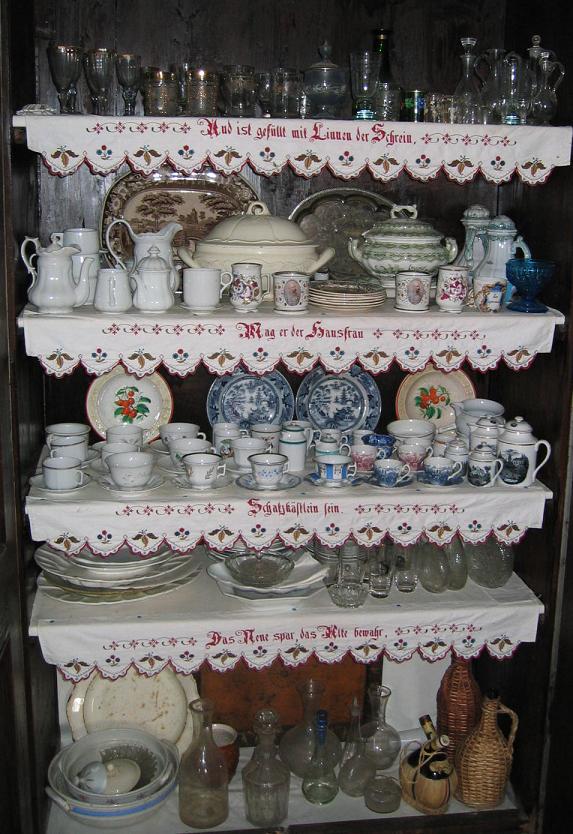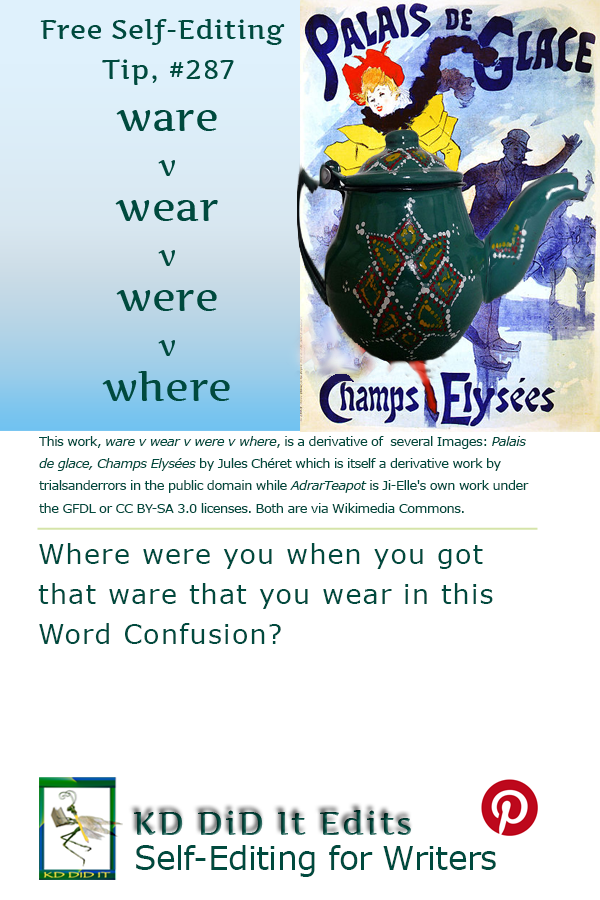“Ware the wear-were-where confusion,” she cried.
Seriously, there is a major confusion and primarily between were, we’re, and where. I swear, I don’t know how it is possible to confuse were with where — if this one is a problem child for you, try thinking of where here is. It’s HERE Where it is.
As for we’re and were, please remember that contractions mean a letter has been removed — the apostrophe is the signal that a letter is missing, therefore we’re is actually we are, and there just ain’t no way that we are looks like were.
You may also want to explore “We’re vs Were vs Where“.
Word Confusions . . .
. . . started as my way of dealing with a professional frustration with properly spelled words that were out of context in manuscripts I was editing as well as books I was reviewing. It evolved into a sharing of information with y’all. I’m hoping you’ll share with us words that have been a bête noire for you from either end.
If you found this post on “Ware v Wear v Were v Where” interesting, consider subscribing to KD Did It, if you’d like to track this post for future updates.
| Ware | Wear | Were | Where |
|---|---|---|---|
 — |
 — |
 |
 — |
| Part of Grammar: | |||
| Adjective 1; Combined form 2; Noun 2; Verb, transitive 3, 4, 5 Plural for the noun: wares Third person present verb: wares |
Noun 1; Verb 1, complement, intransitive, or transitive 2 Plural for the noun: wears Third person present verb: wears |
Infinitive is to be
Noun 1; Prefix 2 Verb 3 is the second person singular past, plural past, a past subjunctive of to be; Verb, auxiliary; Verb, linking Plural for the noun: weres |
Adverb, interrogative or relative; Conjunction; Noun; Pronoun Plural for the noun: where |
| Commodity
Adjective: [Archaic] Aware 1 Watchful, wary, or cautious Combined Form: Denoting a kind of software Noun: Articles offered for sale
[Archaeology] A group of ceramic types classified according to paste and texture, surface modification, as burnish or glaze, and decorative motifs rather than shape and color Verb, transitive: Used as a warning cry, typically in a hunting context 3
[Scottish and North England] To spend 4 Expend The first season in the year 5 Spring |
To have on
Noun: The wearing of something 1 The state of being worn as clothing Clothing suitable for a particular purpose Damage or deterioration sustained from continuous use Capacity for withstanding continuous use Verb, complement:
Verb, intransitive: [Of a period of time; wear on] Pass, especially slowly or tediously Verb, transitive:
Damage, erode, or destroy by friction or use
[Sailing] Bring a ship about by turning its head away from the wind 2 |
Most commonly, to be
Noun: [Archaic] Man, as in human male 1 [Fandom slang] The collective name for any kind of person that changes into another form under certain conditions, including the werewolf
A style of artwork that involves anthropomorphic creatures in an often digitrade form WW:tA gamers Roleplayers who want to fit into a community to feel “speshul” A military force, a band of troops (Also wered and wering)
Prefix: Verb: CAUTION: We’re is the contraction for we are, and the same applies to you’re meaning you are, and they’re is they are. [Usually there is/are] Exist Be present [With adverbial] Occur
[Informal] Say Verb, auxiliary: Used with a past participle to form the passive mood [With infinitive] Used to indicate something due to happen
[Archaic] Used with the past participle of intransitive verbs to form perfect tenses Verb, linking:
|
A place
Adverb, interrogative: In or to what place or position
Adverb, relative: The place or situation in which
Conjunction: Whereas Noun: The scene of something Pronoun: The place in which Point at which |
| Examples: | |||
| Adjective: Thou speak’st wiser than thou art ware of. Combined Form: I need some new bakeware. Check out this shareware. This new groupware we got streamlines the workload. I hate spyware. Have you been to the warehouse yet? Noun: Sellers at the flea market display their wares. Mary, can you set the silverware around the table? You can’t go wrong with glassware as a wedding gift. Verb: |
Noun: There are some new dresses just in for wear in the evening. Have you any sportswear? There’s not a lot of wear on these shoes. Verb, complement: The mountains are wearing down with each passing second. Verb, intransitive: There aren’t many carpet-type finishes that wear well. As the afternoon wore on, he began to look unhappy. Verb, transitive: Both ladies wore a bunch of violets. Although she was a widow, she didn’t wear black. They wear a frozen smile on their faces. The students wore their hair long. The pirate ship wore a Venezuelan flag. The water was forced up through holes it had worn. The environmental health people wouldn’t wear it. Wearing half the day, they spun long tales. The captain gave orders to wear ship. |
Noun: She takes pride in her spirituality as a were, although to know her from the outside, one would never suspect. There are some awesome were artists out there, but don’t they draw anything else? Hey, look, another self-proclaimed were has found their way to the boards. Didn’t you know that Jake was a were? Prefix: The weregild will be high for a mother and child. I wonder what size werebear he turns into? Verb: There were no easy answers. There were no curtains around the showers. If the exhibition were in November, I could attend. We were here. They were headed over to the theatre. Most of us were hungover. If I were you . . . Weren’t you at the game last night? We were coming tonight, but the car broke down. Where were you? When I got there, they were like “What are you doing here?” Verb, auxiliary: If it were said . . . If his book were to be published this fall, we would get a jump on the competition. If construction were to begin next summer instead of next fall, it could be finished three months earlier. If I were to meet him at 6:30, I could see you at 9. You were to follow these orders. If I were to lose, the results would be catastrophic. If I were to tell you, you’d think I was crazy. Verb, linking: Jayne’s parents weren’t doing well. The tickets were $25. We were everything to each other. The multi-story buildings were all over the campus. |
Adverb, interrogative: Where do you live? Where are you from? Where is she going? Where do you come from? Where does the argument lead? Where did you read that? Just where is all this leading us? Adverb, relative: Sit where I can see you. This is where I live. Where people were concerned, his threshold of boredom was low. He was free to go where he liked. Conjunction: Where some caregivers burn out, others become too involved. Do you see where the men in your life are emotionally unavailable to you? I see where the hotel has changed hands again. Noun: It’s where he was living when I knew him. Boston Store is where I got my new bathing suit. Pronoun: This is where the boat docks. That was where the phone rang. |
| Derivatives: | |||
| Adjective: unwearing, wearable, wearing Adverb: wearingly Noun: wearability, wearable, wearables, wearer Plural noun: warez |
|||
| Phrasal Verb | |||
| wear off wear out wear someone down wear someone out wear something down wear something out |
be about be off |
||
| History of the Word: | |||
|
|
|
Old English hwær of Germanic origin. |
C’mon, get it out of your system, bitch, whine, moan . . . which words are your pet peeves? Also, please note that I try to be as accurate as I can, but mistakes happen or I miss something. Email me if you find errors, so I can fix them . . . and we’ll all benefit!
Satisfy your curiosity about other Word Confusions on its homepage or more generally explore the index of self-editing posts. You may also want to explore Book Layout & Formatting Ideas, Building Your Website, Formatting Tips, Grammar Explanations, Linguistics, Publishing Tips, the Properly Punctuated, and Writing Ideas and Resources.
Resources for Ware v Wear v Were v Where
Some of these links may be affiliate links, and I will earn a small percentage, if you should buy it. It does not affect the price you pay.
Apple Dictionary.com
Brians, Paul. “we’re / were.” Common Errors in English Usage. ed 3. Washington State University. William, James & Company, 2013. <http://public.wsu.edu/~brians/errors/were2.html>. Buy the paperback at Amazon.
Pinterest Photo Credits
This advertising poster, Palais de glace, Champs Elysées, is by Jules Chéret which is itself a derivative work by trialsanderrors in the public domain while Adrar Teapot is Ji-Elle’s own work under the GFDL or CC BY-SA 3.0 licenses. Both are via Wikimedia Commons.
Revised as of 22 Dec 2024
By: Kathy Davie

